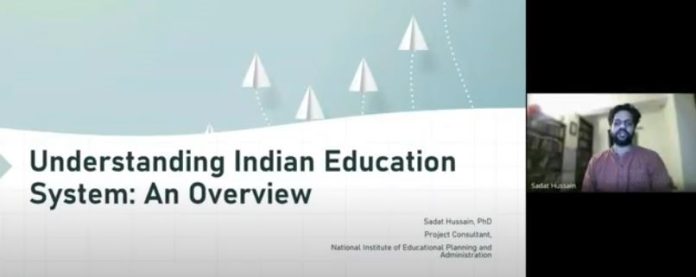In-depth Discussion on India’s Education System at the Markazi Taleemi Board Lecture
New Delhi: An online session was organized by the Markazi Taleemi Board (MTB) as a part of its Master Trainers Programme on Saturday, focusing on “A Historical Overview of the Indian Knowledge System.” This lecture was delivered by Dr. Sadat Hussain. The session attracted teachers, students, and individuals from various fields.
In this online session, Dr. Sadat Hussain provided a detailed analysis of the Indian education system, covering its evolution, present-day challenges, and historical efforts to bring about reform and democratize education. The session also discussed the persistent social inequalities within the system and the ongoing struggle for equal educational opportunities.
Dr. Sadat highlighted the deep-rooted caste-based hierarchy in India’s educational system, explaining that historically, education within the Gurukul system was largely restricted to the upper castes. He pointed out that this monopoly still exists in many modern institutions, where the elite class continues to dominate, leaving disadvantaged groups with limited access to quality education.
The lecture also acknowledged the contributions of prominent social reformers like Jyotirao Phule, Savitribai Phule, and Shahu Maharaj, who advocated for social justice and worked towards the universalization of education. Dr. Sadat praised these leaders for their visionary efforts in dismantling the caste hierarchy and ensuring education for all sections of society.
A significant portion of the session was devoted to the Constituent Assembly Debates (CAD) concerning India’s education policy. Dr. Sadat underscored the key role played by Dr. B.R. Ambedkar, who strongly advocated for universal, free, and compulsory education. He also discussed the contributions of important figures like Sardar Harnam Singh and K.M. Munshi in drafting the constitutional provisions related to education.
Dr. Sadat also elaborated on the challenges faced in establishing the Right to Education as a fundamental right. The debates included members like M. Ruthnaswamy and Alladi Krishnaswamy, who raised concerns about the financial feasibility of providing free education for all. Due to these concerns, the provision was ultimately included in the Directive Principles of State Policy, making it non-enforceable by law.
Dr. Sadat highlighted a key moment from November 23, 1948, when the Constituent Assembly debated a draft provision stating that free and compulsory primary education must be provided to all children up to the age of 14 within 10 years of the Constitution’s commencement. This commitment was enshrined in Article 45 of the Constitution, making it the only Directive Principle with a specified timeline, reflecting the urgency felt by the framers of the Constitution.
Dr. Sadat concluded his talk by emphasizing the need for renewed efforts to uphold the principles of inclusive and accessible education, as envisioned by India’s constitutional leaders. He stressed the importance of continued reforms to address social inequalities and ensure that every child, regardless of background, has access to quality education.
This informative session shed light on the complex history of India’s education system and the ongoing struggles for reform, providing important insights for educators, policymakers, and the general public.




